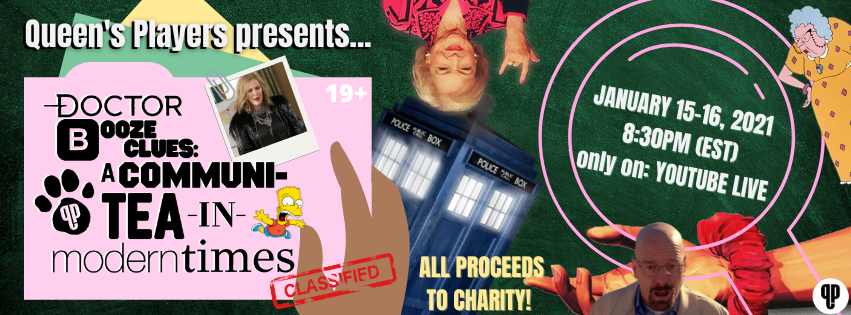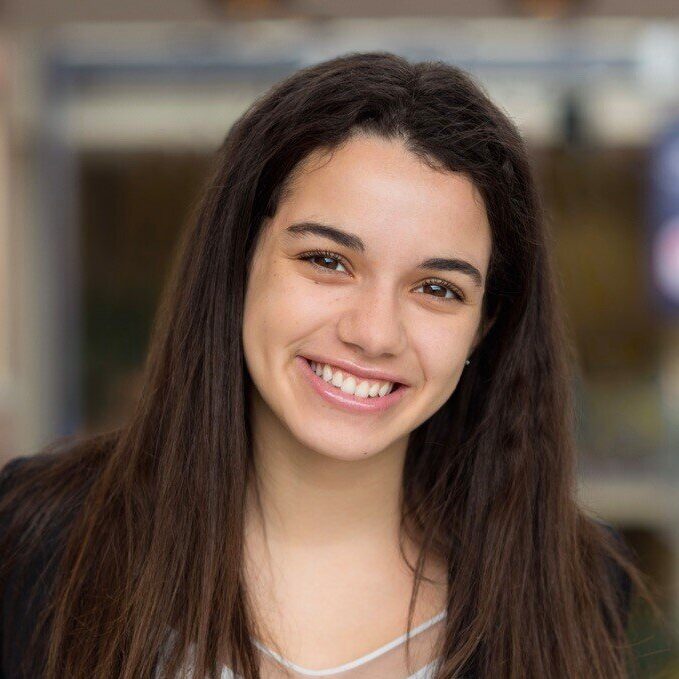Queen’s Players Goes Virtual!

What do famed Canadian comedians Lorne Greene, Robertson Davies and eleven current Queen’s students all have in common? Queen’s Players!
The oldest club at Queen’s University, dating back to 1900, Players describe themselves as “a cross between Saturday Night Live, a rock concert, and a kegger.”
In a non-COVID world, Players would consist of crowded performances at The Mansion full of flowing pitchers and Players singing along to pop hits while performing sketches of relevant pop culture icons.
Yet, when COVID-19 hit last March, for a club that literally thrived off of people performing in packed spaces, the temporary future of Players looked bleak. Would Players be able to successfully transition to a virtual environment? Would audiences be able to experience the same silliness that Players has prided itself on for 120 years?
With their upcoming show Doctor Booze Clues: A CommuniTEA In Modern Times on January 15 and 16, and determined to get answers on how Players managed to make the unimaginable work, I reached out to the cast and creative of this memorable production.
I spoke with Callum McNeil, Co-Director of the upcoming show, Caroline Williams, a cast member who’s previously performed live with Players, and Francesa Amato, a cast member who’s making her Players debut virtually.
First and foremost, I was curious about the audition process for virtual Players. Francesa Amato, stated that having previously auditioned for Players, mentioned that the virtual auditions “didn’t feel much different from the in-person process. I’ve auditioned for the show before so I kind of knew what was coming.”
When asked how the pandemic was weaved into the Players storyline, if at all, McNeil explained that “the show is taking place during the pandemic, virtually, that’s kind of how we explain why we’re all on these screens and everything right?”
He then proceeded to explain how Players did not want to make the pandemic the focus of the plot. “We watch things to kind of escape their harsh reality sometimes. So we don’t want to be constantly reminded that we’re locked indoors.” McNeil explained.
Despite the entire production being shifted online, McNeil, Williams and Amato all noticed some unique strengths to a virtual production.
McNeil felt that “it allows people to make sure that their ideas are getting heard, and to call on people who haven’t been talking a lot just to get their input. So I would say that it definitely kind of opened up an avenue to kind of make sure the cast felt more included during the writing process.”
Williams said the biggest highlight of virtual rehearsals was that everyone felt comfortable and confident in their own physical environments. As she explains, “everybody just came in with this cool, calm, collected, but confident energy, which was awesome. There was something about everyone physically being in a very comfortable space.”
Amato noted how Zoom allowed for more individual attention and rehearsals, “not only am I able to rehearse on a zoom call with you, I can schedule later and do it again.” While Players is meant to be a source of escapism and entertainment for its audience, for Amato, the rehearsals served as a source of escapism throughout the chaos that is COVID-19. As she explains, “I really appreciated having a group of people that I could work with, but also, laugh with and to create with and play with. It’s really the only show that I’ve ever been a part of where your comedy can really be as truthful as it wants.”
Williams similarly felt that creativity was enhanced through Zoom, since “you just don’t have that pressure of being around other physical bodies and, you can take your time with jokes, or you could really roll with something while still spitballing off somebody else.”
Amato felt that a shining light of virtual rehearsals were how accessible they were, “I’ve been at a friend’s house during a player’s rehearsal. I like doing rehearsals from home in Toronto, and although it’s obviously like a COVID measure to not be in person, it’s been nice because you really can do it anywhere”.
McNeil also felt that a virtual show makes Players more accessible than ever. “We’re doing this virtually on YouTube Live, really, the audience can be however big it is, we don’t have to put a limit on that number at all. And you don’t have to pay to get in. Usually, for players, you have to pay to get a ticket, this is free. … So I think it might actually generate a bit more interest, which I’m pretty excited about.”
Amato stated that despite the shift to a virtual world, she felt that the social aspect was still intact. She explained that “there have been a few times where we have a rehearsal, and then we’ll have like a Zoom hangout, you know what I mean? Or playing a Zoom game. So I think that the friendship and the social connections, are definitely still there”. Amato also mentioned a particularly innovative way that Players are responding to the virtual production. In terms of buying drinks for the cast onstage, virtually, Amato mentioned that “this time around, you can donate one of those. So the money goes towards a drink, but it goes towards charity. And then the person that you’re donating for, if someone wants to get me a drink, and they donate, I would drink on camera?”
Despite the unique positives of virtual outcomes, there were inevitable downsides that all three interviewees noted. McNeil indicated that a key weakness to the virtual process was that “If you get really excited in person, they can feed off that. And you can come up with kind of, I think, other ideas.” However, he felt that the energy and creativity has been fantastic virtually.
While Amato was impressed with how Players still managed to socialize frequently with each other virtually, Williams still felt the socialization was limited compared to prior productions. Reflecting on previous Players shows that she’s participated in, she recalled that “there were always people meeting up and hanging out and, Players are very much like what you made of it. You hung out all the time, if in fact that wasn’t your vibe, you didn’t have to”.
The other weakness that Williams noticed was she felt limited in her role as an Alumni, within a virtual context. Players place a great emphasis on the Alumni and Rookie dynamic, where Alumni act as role models for the Rookies, and often these relationships create long-lasting friendships. When Williams was a Rookie, she felt that the Alum in her production served as great role models. She explains that “I would love to be able to do the same (to the Rookies) but it’s, it’s harder, right? Unless I’m writing a scene with Rookies or I don’t feel as comfortable having not been around them in person a lot. … Nobody wants to spend more time on technology. So that was difficult, because I would have loved to have been a mentor for them. But, and hopefully in some capacity, I still was.”
Williams brought up an interesting perspective on the limits of virtual rehearsals. She felt that she wasn’t able to know “the [production] team in the same capacity”. She explained that in previous productions, “the stage manager would always be at rehearsal or one of the producers and you’d like to get to know them a bit.” Unfortunately this was not the case for the current virtual production. However, Williams felt that her favourite parts of Players, for her, the choreography rehearsals, “were just as fun on Zoom”.
Despite some obvious limitations of a Virtual production, the Players team has managed to devise another memorable production that audiences can catch on January 15 and 16. Further information of the upcoming Production can be found at https://www.facebook.com/events/314579246515201.
